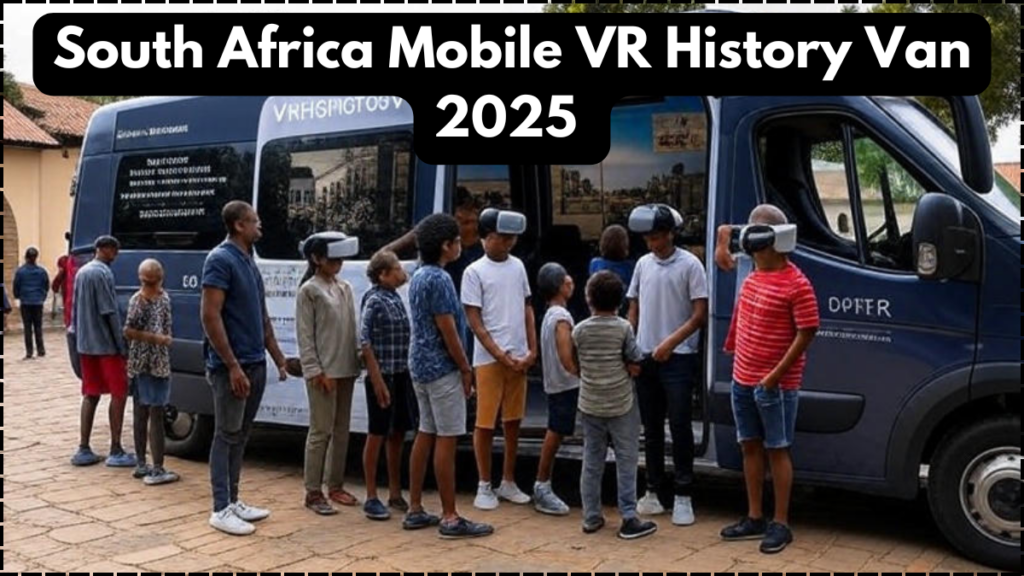The VR History Van is set to revolutionize how South Africans experience their heritage in 2025. This cutting-edge Mobile Education Unit travels to towns, cities, and remote villages, bringing history to life through immersive virtual reality experiences. Instead of reading about significant moments in a textbook or watching static documentaries, students and community members can now step inside the past, experiencing pivotal events as if they were there in person.
This initiative combines technology and education in a way that bridges generations. For older residents, it’s a nostalgic journey that validates oral histories, while for younger audiences, it’s a dynamic way to connect with lessons that might otherwise feel distant or abstract. By taking the Mobile Education Unit on the road, the VR History Van ensures that world-class learning resources aren’t limited to urban centers — they’re accessible to everyone.

The Role of the Mobile Education Unit
The Mobile Education Unit at the heart of the VR History Van is more than just a transport vehicle — it’s a fully equipped learning hub. Inside, visitors find VR headsets, interactive touchscreens, and curated multimedia content tailored to South African history and culture. Trained educators accompany each trip, guiding participants through the experience and encouraging discussions afterward.
Key features of the Mobile Education Unit include:
-
High-resolution VR headsets for realistic experiences
-
Portable seating and learning zones
-
Solar-powered equipment for off-grid operation
-
Multilingual content to cater to diverse communities
By taking this approach, the VR History Van ensures that even remote villages with limited infrastructure can benefit from a high-quality educational experience.
Historical Themes and Programs
The 2025 program lineup for the VR History Van covers a wide range of historical periods and events. Each VR module is designed to be both educational and engaging, blending visual immersion with accurate storytelling. Here’s a look at some of the featured themes:
| Theme Name | Historical Period/Focus | Learning Outcomes |
|---|---|---|
| Freedom’s Path | Apartheid and the road to democracy | Understand key figures and milestones |
| Ancient Horizons | Pre-colonial civilizations | Explore early trade and cultural exchange |
| Voices of the Land | Indigenous heritage and traditions | Preserve oral histories and customs |
| The Industrial Leap | 20th-century urban growth | See how modernization shaped society |
This variety ensures that the VR History Van appeals to students, educators, and history enthusiasts alike.
Community Impact of the VR History Van
By bringing the Mobile Education Unit directly to communities, the VR History Van addresses one of the biggest challenges in education: access. Many rural schools lack the resources for field trips to museums or historical landmarks. With the VR History Van, the museum comes to them.
The impact extends beyond the classroom. Local events often form around the van’s arrival, turning each visit into a celebration of learning. Parents, elders, and children gather together, creating intergenerational dialogue about South Africa’s past. This shared experience fosters pride in cultural heritage and sparks curiosity about lesser-known historical narratives.
A Vision for the Future
The VR History Van project reflects a broader vision for education in South Africa — one that blends traditional teaching with modern technology. The Mobile Education Unit model could eventually be adapted for other subjects, from science and environmental studies to vocational training. As VR technology continues to advance, the possibilities for deeper, more interactive learning are nearly limitless.
By making history tangible and emotionally resonant, the VR History Van shows that learning can be both informative and unforgettable. It’s not just about memorizing dates — it’s about feeling the weight of the moment as if you were there.
Conclusion
In 2025, the VR History Van stands as a shining example of how technology can transform education. Through its versatile Mobile Education Unit, it delivers immersive historical journeys to people who might otherwise never have the opportunity. More than just a vehicle, it’s a moving classroom, a cultural ambassador, and a bridge between the past and the future.
FAQs
What is the VR History Van?
The VR History Van is a traveling educational project equipped with virtual reality technology to teach history in an immersive way.
How does the Mobile Education Unit work?
The Mobile Education Unit is a specially designed vehicle with VR headsets, multimedia tools, and educators who guide participants through the experience.
Who can access the VR History Van?
Schools, community groups, and public gatherings in both urban and rural areas can request a visit from the VR History Van.
What kind of history is covered in the program?
The program includes South African heritage, world history events, and cultural preservation modules tailored to local audiences.
Click here to learn more
Sachin is a dedicated writer specializing in education, career, and recruitment topics, delivering clear and actionable insights to empower readers.
